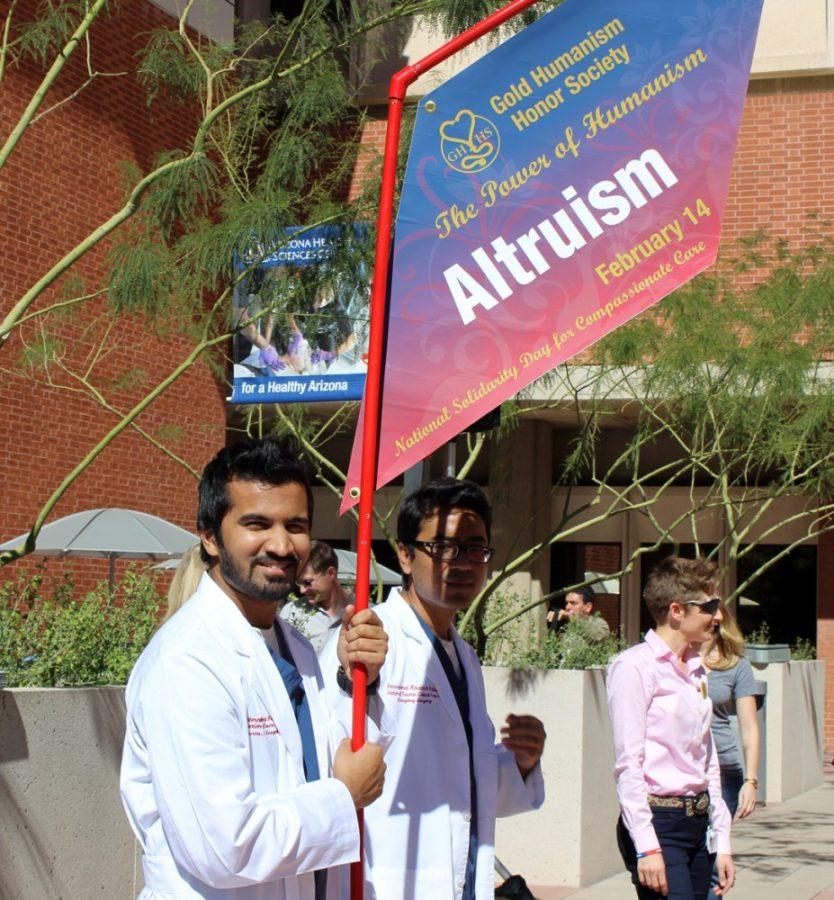Today kicks off Solidarity Week, a week of events hosted by the Arnold P. Gold Foundation at the Arizona Health Sciences Center campus to recognize and encourage compassionate medical care.
Rachel Manzo, student representative for Solidarity Week and member of the Gold Humanism Honors Society, said Solidarity Day was started by GHHS at the UA in 2011 and has been hosted every year on the Friday closest to Valentine’s Day. She said the U.S. Senate now recognizes National Solidarity Day for Compassionate Patient Care, and over 75 medical schools around the country also celebrate. Manzo said this year, the UA decided to expand Solidarity Day into a week of events.
“While I can practice humanistic medicine and I can hold that value to be important to me,” Manzo said, “I think its more important to hold your peers to the same standard and to encourage the wider community to practice medicine that way.”
Manzo also said Solidarity Day was started to recognize acts of kindness toward patients, such as the compassion demonstrated by Dr. Randall Friese, the trauma surgeon who took care of Gabrielle Giffords after the 2011 Tucson shooting. The week of events and lectures is also meant to encourage members of the wider hospital community to remember the importance of compassion.
“This year, we’re partnering with the Ben’s Bells Project, who have recently launched a campaign in Tucson called the Be Kind campaign,” Manzo said. “The mission of the two organizations kind of intersects.”
Jeannette Maré, founder of Ben’s Bells, will speak at the AHSC on Monday. Members of the hospital community will be encouraged to recognize acts of kindness they’ve witnessed by filling out “Be Kind” strips.
According to the agenda for the week on the College of Medicine’s website, sister Dr. Adele O’Sullivan, the College of Medicine Tucson Alumna of the Year, will be speaking at the Solidarity Week event on Tuesday. Manzo said O’Sullivan established a respite center for homeless people being discharged from the hospital in Phoenix and is an example of humanstic medicine in action.
Friday is Solidarity Day, and members of the hospital community, as well as health sciences graduate students, are invited to the AHSC Plaza where Manzo said attendees will be asked to form a human chain around the courtyard.
“We remind everybody that it only takes a moment to make a human connection,” Manzo said. “We ask them to tell the people on either side of them something about themselves that they think is important, preferably something they don’t already know.”
Manzo said she is excited about the “Tell Me More” project, an event that incorporates patients into Solidarity Week, where groups of medical students visit inpatient units to get to know them through a brief interview.
“Together, the patient and the student make a poster to be hung above the patient’s bed,” Manzo said, “so that everyone who enters the room is reminded of who they are as individuals.”
Whitney Mudd, a nursing junior, said she thinks the care of the individual is the biggest part of health care.
“Medicine has become so dehumanizing, and because of it, people heal slower or end up with emotional instability,” Mudd said. “Individual-based care helps people get healthier faster and, ultimately, be happier with the outcomes of their care.”
_______________
Follow Brandi Walker on Twitter.









